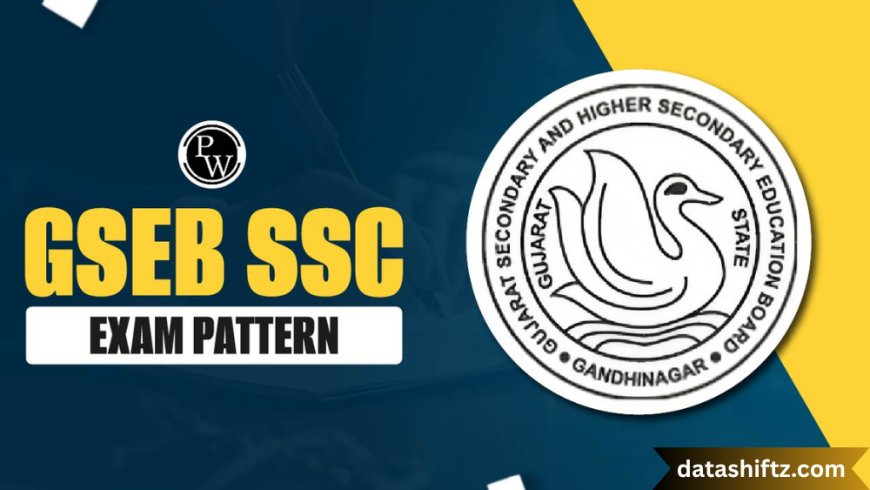GSEB: Gujarat Secondary and Higher Secondary Education Board – A Comprehensive Guide

Introduction
The Gujarat Secondary and Higher Secondary Education Board (GSEB) is a prominent educational authority in the Indian state of Gujarat, responsible for conducting school-level examinations, prescribing syllabus, and implementing educational reforms. Established in 1972, GSEB plays a crucial role in shaping the academic future of lakhs of students across the state.
In this comprehensive blog, we’ll explore the origin, functions, structure, examination system, syllabus, grading, and digital initiatives taken by GSEB. We will also include easy-to-understand tables and lists for a better grasp of the Board's operations.
Origin and Structure of GSEB
Historical Background of GSEB
The Gujarat Secondary and Higher Secondary Education Board was established under the Gujarat Secondary Education Act 1972. It was created to improve school education standards in the state and to ensure transparency and quality in academic evaluation.
The Board functions under the supervision of the Department of Education, Government of Gujarat. Over the years, GSEB has introduced several digital and academic reforms to align with national education policies.
Organizational Framework
The organizational structure of GSEB is as follows:
| Department | Function |
|---|---|
| Chairman | Head of the Board |
| Secretary | Administers policy execution |
| Examination Wing | Manages SSC and HSC exams |
| Curriculum Development | Designs syllabus and updates textbooks |
| Results and Evaluation | Oversees results, rechecking, revaluation processes |
| IT Cell | Manages online services and digital portals |
Examinations Conducted by GSEB
Major Exams by GSEB
GSEB is responsible for conducting two major public exams annually:
-
Secondary School Certificate (SSC) – Class 10
-
Higher Secondary Certificate (HSC) – Class 12
These exams are usually held in March, and results are declared between May and June.
| Exam | Class | Streams | Subjects Offered |
|---|---|---|---|
| SSC | 10th | General | English, Maths, Science, Social Studies, etc. |
| HSC | 12th | Science, Commerce, Arts | Physics, Chemistry, Biology, Accountancy, Economics, etc. |
GSEB Grading System
The board follows a percentile rank system along with grades:
| Marks Range | Grade | Meaning |
|---|---|---|
| 91 – 100 | A1 | Excellent |
| 81 – 90 | A2 | Very Good |
| 71 – 80 | B1 | Good |
| 61 – 70 | B2 | Above Average |
| 51 – 60 | C1 | Average |
| 41 – 50 | C2 | Fair |
| 33 – 40 | D | Pass |
| Below 33 | E | Fail |
Curriculum and Syllabus Structure
Overview of Curriculum
GSEB designs the academic syllabus and textbooks for Classes 1 to 12. The syllabus is periodically revised to incorporate updated knowledge, promote conceptual learning, and align with National Education Policy (NEP) standards.
| Level | Core Subjects |
|---|---|
| Primary (1–5) | Gujarati, Mathematics, EVS |
| Upper Primary (6–8) | Science, Social Studies, English |
| Secondary (9–10) | Maths, Science, Social Science, Languages |
| Higher Secondary (11–12) | Stream-specific subjects (Science, Commerce, Arts) |
Medium of Instruction
GSEB offers instruction in multiple mediums:
-
Gujarati (majority of schools)
-
English
-
Hindi
-
Urdu
-
Marathi
-
Sindhi
-
Sanskrit
Digital Initiatives by GSEB
Online Services for Students and Teachers
GSEB has implemented several digital platforms to streamline academic services:
Key Online Portals
-
www.gseb.org – Official portal for exam schedules, results, and circulars.
-
www.gsebeservice.com – Online services like hall tickets, result sheets, and migration certificates.
-
Vidyavision App – For checking results and notifications.
-
Digital Gujarat Portal – Scholarship and e-learning support.
E-Learning & Study Material
To enhance learning, GSEB offers:
-
E-books and textbooks in PDF formats
-
Gujarat e-Class videos for Classes 9 to 12
-
Interactive quizzes and self-assessment tools
-
Online question banks and model papers
GSEB Result Trends and Performance
Result Trends (2019–2024)
| Year | SSC Pass % | HSC Science % | HSC General % |
|---|---|---|---|
| 2019 | 66.97% | 71.90% | 73.27% |
| 2020 | 60.64% | 71.34% | 76.29% |
| 2021 | 100% (Due to COVID) | 100% | 100% |
| 2022 | 65.18% | 72.02% | 74.86% |
| 2023 | 64.62% | 72.75% | 73.17% |
| 2024 | 67.11% | 74.01% | 75.22% |
Top Scoring Districts
| District | Average Pass % (2024) |
|---|---|
| Rajkot | 89.5% |
| Ahmedabad | 88.3% |
| Surat | 87.9% |
| Vadodara | 86.7% |
| Gandhinagar | 85.5% |
Rechecking, Revaluation & Supplementary Exams
Revaluation Process
If students are dissatisfied with their results, they can apply for:
Options after Result Declaration
-
Photocopy of Answer Sheet
-
Rechecking of Marks
-
Revaluation of Answers
-
Supplementary Exams for failed subjects
Application Process:
-
Apply via gsebservice.com
-
Pay requisite fees per subject
-
Await updated results (usually 3–4 weeks)
GSEB Purak Pariksha (Supplementary Exam)
This exam gives students a second chance to pass failed subjects.
-
Usually held in July–August
-
Results declared in September
-
Students who pass are issued revised mark sheets
GSEB and the National Education Policy (NEP) 2020
Implementation in Gujarat
GSEB has started aligning its syllabus and pedagogical structures in line with NEP 2020.
Key Highlights:
| NEP Component | GSEB Adaptation Status |
|---|---|
| Skill-based learning | Introduced in HSC |
| Multilingualism | Gujarati + English |
| Coding and Computational Thinking | Being piloted |
| 5+3+3+4 Curriculum | In discussion stage |
| Continuous Assessment | In pilot schools |
New Subject Introductions
-
Artificial Intelligence (AI)
-
Data Science
-
Financial Literacy
-
Environmental Science
These subjects aim to build students' career readiness.
Challenges Faced by GSEB
Current Educational Challenges
-
Rural-Urban Educational Divide
-
Dropout Rates after Class 10
-
Infrastructure Shortages in Remote Areas
-
Teacher Training and Recruitment Delays
Solutions Being Implemented
Recent Reforms
-
Smart classrooms in 1,000+ government schools
-
Free distribution of textbooks
-
Online teacher recruitment portals
-
Special bridge courses for weak students
-
Use of AI tools for evaluation analysis
Conclusion
The Gujarat Secondary and Higher Secondary Education Board (GSEB) continues to play a pivotal role in ensuring academic quality and progress in Gujarat. With dynamic reforms, integration of technology, and focus on skill-based learning, GSEB is gearing up to meet future educational demands while addressing the challenges of the present.
As students, parents, and educators look ahead to new academic years, staying updated with GSEB notifications, adapting to its syllabus changes, and utilizing its digital resources will be key to success.






























